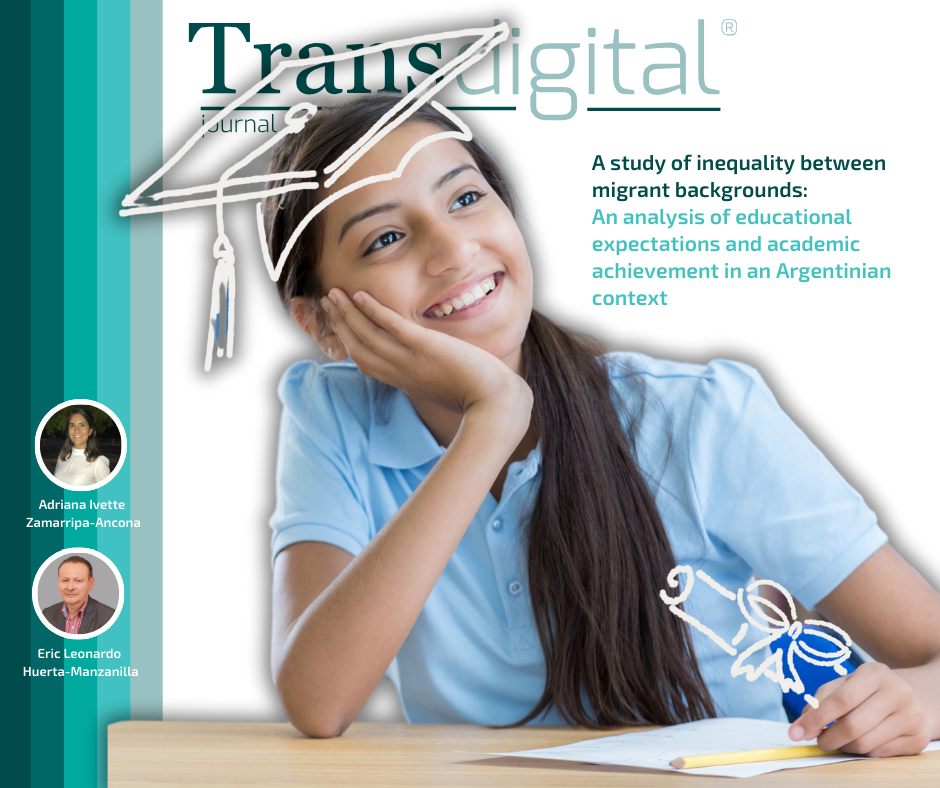A study of inequality between migrant backgrounds: An analysis of educational expectations and academic achievement in an Argentinian context
DOI:
https://doi.org/10.56162/transdigital245Keywords:
educational expectations, academic achievement, migrant background, inequality, ArgentinaAbstract
The present research aims to identify situations of inequality in educational expectations and academic performance among individuals with migration backgrounds in an Argentine context. Results were obtained through various linear regressions and statistical analyses. The findings show that Argentine students do not need to rely on their academic performance to form high educational expectations. Migrant students have higher educational expectations and better academic performance compared to national students. Native students perceive greater emotional support from their parents. Female students have higher educational expectations, while male students have better academic performance. Similarly, our results indicate that students with higher economic, social, and cultural levels will have better academic performance and higher educational expectations. Equality in teacher support was found among all students, as they all have the same positive perception of the support provided by teachers. The final finding demonstrates teachers' constructive and equitable commitment to students, regardless of their migratory background.
References
Ali, J., Alsakhe, H., Ibrahim, I., Khattab, N., Madeeha, M., & Shouia, M. (2022). Accounting for educational expectations and achievement among native and migrant students in Qatar. International Studies in Sociology of Education, 1–20. https://doi.org/10.1080/09620214.2022.2034518
Almroth, M., László, K. D., Kosidou, K., & Galanti, M. R. (2020). Individual and familial factors predict formation and improvement of adolescents’ academic expectations: A longitudinal study in Sweden. PLOS ONE, 15(2), e0229505. https://doi.org/10.1371/journal.pone.0229505
Alreshidi, A. M., Alsharif, K. M., & Kandeel, R. A. A. (2022). Five Important Parental Involvement Variables that Affect Young Children’s Mathematical Achievements: A Comparative Study. Education and Urban Society, 54(9), 1072-1096. https://doi.org/10.1177/00131245211048440
Bahena, S. (2020). Hope in the Shadows: Testing the Immigrant Optimism Hypothesis Among College Aspirational Latino Students. Child Development, 91(5), 1423–1438. https://doi.org/10.1111/cdev.13331
Barbero, M. V. (2020). Immigration policy and belonging in the Argentine ‘racial state’. Journal of Ethnic and Migration Studies, 46(19), 4086–4103. https://doi.org/10.1080/1369183X.2018.1544486
Birkelund, J. F. (2020). Aiming High and Missing the Mark? Educational Choice, Dropout Risk, and Achievement in Upper Secondary Education among Children of Immigrants in Denmark. European Sociological Review, 36(3), 395–412. https://doi.org/10.1093/esr/jcz064
Caro, D. H., & Biecek, P. (2017). intsvy: An R Package for Analyzing International Large-Scale Assessment Data. Journal of Statistical Software, 81, 1–44. https://doi.org/10.18637/jss.v081.i07
Domenech, E., & Pereira, A. (2017). Migration Studies and Academic Research on International Migration Policies in Argentina. Íconos. Revista de Ciencias Sociales, 58, 83–108. https://doi.org/10.17141/iconos.58.2017.2487
Gao, C. Y. (2019). Measuring University Internationalization. En C. Y. Gao (Ed.), Measuring University Internationalization: Indicators across National Contexts (pp. 73–110). Springer International Publishing. https://doi.org/10.1007/978-3-030-21465-4_3
Hemmerechts, K., Kavadias, D., & Boone, S. (2022). The Effects of Neighborhood and Parental Educational Expectations on Teacher Judgments of Children in the Fifth and Sixth Grades of Primary School. Urban Education, 57(5), 842–870. https://doi.org/10.1177/0042085920902254
Keung, C. P. C., & Ho, E. S. C. (2020). Structure and Agency in Adolescents’ Expectations of Pursuing Post-secondary Education. Research in Higher Education, 61(2), 270–295. https://doi.org/10.1007/s11162-019-09574-8
Linares, M. D., & Linares, M. D. (2021). Recent Venezuelan Migration to Argentina: A Selective Immigration Policy in the Context of the Immigration Restrictive Turn. Migraciones Internacionales, 12. https://doi.org/10.33679/rmi.v1i1.2300
Lopez-Agudo, L. A., Prieto-Latorre, C., & Marcenaro-Gutierrez, Ó. D. (2021). The Power of Expectations on Students’ Years of Schooling. Journal of New Approaches in Educational Research, 10(2), 295–312.
Lorenz, G., Boda, Z., Salikutluk, Z., & Jansen, M. (2020). Social influence or selection? Peer effects on the development of adolescents’ educational expectations in Germany. British Journal of Sociology of Education, 41(5), 643–669. https://doi.org/10.1080/01425692.2020.1763163
Madeeha, M., Khattab, N., Samara, M., Modood, T., & Barham, A. (2022). Explaining the educational aspirations-expectations mismatch among middle school students: The role of parental expectations, attitudinal and demographic factors. Educational Studies, 1–17. https://doi.org/10.1080/03055698.2022.2088228
Martínez Rojas, D., Muñoz Henríquez, W., & Mondaca Rojas, C. (2021). Racism, Interculturality, and Public Policies: An Analysis of the Literature on Migration and the School System in Chile, Argentina, and Spain. SAGE Open, 11(1), 2158244020988526. https://doi.org/10.1177/2158244020988526
McAuliffe, M., & Triandafyllidou, A. (2021). Informe sobre las Migraciones en el Mundo 2022. Organización Internacional para las Migraciones (OIM). http://www.sela.org/media/3224655/migraciones-en-el-mundo-2022.pdf
OECD. (2019a). Chapter 16—Scaling procedures and construct validation of context questionnaire data. En PISA 2018 Technical Report. https://www.oecd.org/pisa/data/pisa2018technicalreport/PISA2018_Technical-Report-Chapter-16-Background-Questionnaires.pdf
OECD. (2019b). PISA 2018 Results (Volume II): Where All Students Can Succeed. OECD. https://doi.org/10.1787/b5fd1b8f-en
OECD. (2019c). PISA 2018 Results (Volume III): What School Life Means for Students’ Lives. Organisation for Economic Co-operation and Development. https://www.oecd-ilibrary.org/education/pisa-2018-results-volume-iii_acd78851-en
Palacios-Abad, A. (2021). Strive to Succeed? The Role of Persistence in the Process of Educational Attainment. American Behavioral Scientist, 65(11), 1555–1576. https://doi.org/10.1177/0002764221996758
Peng, X., Sun, X., & He, Z. (2022). Influence Mechanism of Teacher Support and Parent Support on the Academic Achievement of Secondary Vocational Students. Frontiers in Psychology, 13, 863740. https://doi.org/10.3389/fpsyg.2022.863740
Redondo, P. (2020). Early Childhood Education in Argentina within a Latin American Perspective. Vol 40(4–5), 387–398. https://doi.org/10.1080/09575146.2020.1825343
Salazar, L., Cebolla-Boado, H., & Radl, J. (2020). Educational expectations in the great recession: Has the impact of family background become stronger? Socio-Economic Review, 18(2), 465–491. https://doi.org/10.1093/ser/mwy046
Scheeren, L., & Bol, T. (2022). Gender inequality in educational performance over the school career: The role of tracking. Research in Social Stratification and Mobility, 77, 100661. https://doi.org/10.1016/j.rssm.2021.100661
UNESCO/PNUD/UNICEF/BM/ONU/ACNUR. (2016). Education 2030: Incheon declaration and framework for action: towards inclusive and equitable quality education and lifelong learning for all. UNESCO/PNUD/UNICEF/BM/ONU/ACNUR. https://unesdoc.unesco.org/ark:/48223/pf0000245656
Van Den Berghe, L., Pouille, A., Vandevelde, S., & De Pauw, S. S. W. (2022). Looking beyond primary barriers: Support workers’ perspectives on school dropout among students with a migration background. Journal of Ethnic & Cultural Diversity in Social Work, 1–13. https://doi.org/10.1080/15313204.2022.2094519

Downloads
Autor de correspondencia
El autor de correspodencia se identifica con el siguiente símbolo: *Published
How to Cite
License
Copyright (c) 2023 Adriana Ivette Zamarripa-Ancona, Eric Leonardo Huerta-Manzanilla

This work is licensed under a Creative Commons Attribution 4.0 International License.
All articles in Transdigital are licensed under a Creative Commons Attribution 4.0 International License. Authors hold the copyright and retain publishing rights without restrictions.









